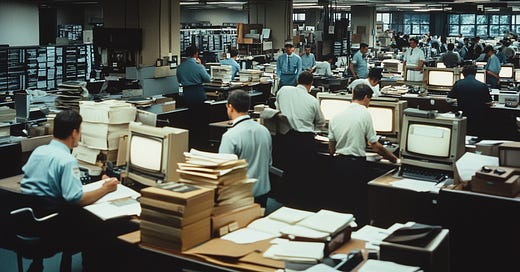
You are reading the news wrong
Being a Wall Street reporter showed me how to actually get an edge from consuming financial media.
“Buy the rumor, sell the news.”
I always liked that old Wall Street saying.
Yet what I’ve gleaned from several years reporting on money, banks, and finance is that in reality, even if you catch wind of a rumor, you’re probably too late to buy anyway.
As someone who has worked in a mainstream corporate newsroom and now operates as an independent journalist, two things ring true:
Financial reporters are excellent at knowing what’s happening in markets
Financial reporters are not the best source for unique financial information
These statements sound contradictory. I can tell you as a financial reporter myself that they are not.
The role of the press is to document and report what is newsworthy. When it comes to finance, information typically becomes newsworthy only after it has moved markets. Once a narrative hits the papers, it’s too late to be actionable.
Even a breaking news story or a coveted scoop is unlikely to be trade-worthy.
Most of the best investors in history land a tiny amount of winning bets across their careers. Once they have one in hand, they certainly are not rushing to tell anyone else about it — let alone leak it to the press.
The incentives simply are not aligned for this to make sense.
I’m proud to say I have some solid relationships with some savvy and good people across Wall Street. As much as they might know how I’d love to get an exclusive for my newsletter, they have very little reason to fill me in on something that could make them money.
Plus, if their idea is genuinely newsworthy, they won’t need to tell a reporter for it to make headlines.
The financier or executive who purports to send their best ideas down the newswire is not sitting on something newsworthy. In fact — PR firms should take note — that’s usually a sign that the person or idea is not serious.
Still, reporters can be baited here into turning a weak or false rumor into a news article. It’s an unproductive cycle that supports my view that despite financial reporters’ grasp of markets, they are not the best source for needle-moving financial information.
And to be clear, I’m not trying to berate or blame reporters. Their (our) job is to translate what analysts and bankers and economists can’t explain well enough in their own words. The press articulates, provides context, and strips away jargon.
Generally, I do think more information is better than less. Context is not nothing — though it can be counterproductive when mistaken for edge. It can be financial suicide if it makes you think you know something that the market does not.
There’s something called the Efficient Market Hypothesis, which states that asset prices — like that of a stock — always reflect all available information, instantly. Smart people have poked holes in this theory, but for 98% of investors it’s reasonable to take it at face value.
So EMH in mind, you won’t see anything in Bloomberg or CNBC that gives you any edge that a sophisticated market does not already reflect.
The market, as they say, has priced in far more than you — or a news outlet — could ever know.
Again, I say all this as someone embedded in markets who reads and writes the news. Media informs what I produce, who I interview, and what to research. Sometimes a certain story sends me down this or that rabbit hole, and whatever I find at the bottom becomes my next reporting project.
That said, I do not rely on newspapers for anything beyond context and translation.
The Wall Street Journal runs headlines that people on Wall Street have known about for months ahead of time. The news is new to readers but it is not “new.”
An editor who worked at Barron’s told me some time ago to read financial news as if it were a sentiment tracker. Granular details and stock prices are nice to know, but a big-picture temperature check, she argued, is more useful.
This editor advised me to gauge specifically for enthusiasm, exuberance, greed, and fear — four emotions that speak louder about markets than any charts or data.
Sure, these items don’t fit into equations. Yet intentionally looking for them will certainly sharpen your gut instincts.
Now, I pride myself on writing the most timely, up-to-date and forward-looking financial newsletter in the business (sign up here if you haven’t). At the same time, I’m under no illusions about how impossible it is to “front-run” the market with any type of informational edge.
If a market is free and efficient, you can assume it has already reacted to anything you might find in a newspaper or your inbox.
Financial news may not offer the most unique edge or insight, but it does provide a compass — not to where the market is headed, but to the emotions that will take it there.





